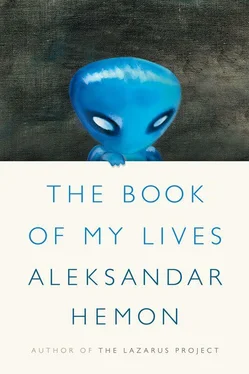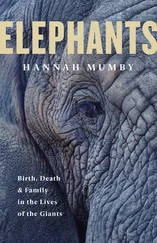Therefore it was of utmost significance that Edgewater turned out to be the neighborhood where shiploads of Bosnians escaping the war ended up in the spring of 1994. I experienced a shock of recognition one day when I looked out my window and saw a family strolling down the street — where few ever walked, except in pursuit of heroin — in an unmistakably Bosnian formation: the eldest male member leading the way, at a slow, aimless pace, hands on their butts, all of them slouching, as though burdened by a weighty load of worries. Before long, the neighborhood was dense with Bosnians. Contrary to the local customs, they took evening walks, the anxiety of displacement clear in their step; in large, silent groups, they drank coffee at a lakeside Turkish café (thereby converting it into a proper kafana ), a dark cloud of war trauma and cigarette smoke hovering over them; their children played on the street, oblivious to the drug business conducted on the corner. I could monitor them now from my window, from the kafana , on the street. It was as if they had come looking for me in Edgewater.
* * *
In February 1997, a couple of months before my first return to Sarajevo, Veba came to Chicago for a visit; I hadn’t seen him since my departure. For the first few days, I listened to his stories of life under siege, the stories of horrible transformation the war had forced upon the besieged. I was still living at the AiR. Despite the February cold, Veba wanted to see where my life was taking place, so we wandered around Edgewater: to the Shoney’s, the chess café, the kafana on the now-iced-over lake. He got a haircut at my barber’s; we bought meat at my butcher’s. I told him my Edgewater stories: about the young woman on the ledge, about the Bosnian family walking in formation, about Peter the Assyrian.
Then we ventured out of Edgewater to visit Ukrainian Village, and I showed him where I’d lived; I took him to the Burger King where I’d fattened myself into American shape while listening to old Ukes discussing Ukrainian politics over sixty-nine-cent coffee — I used to call them the Knights of the Burger King. We wandered around the Gold Coast, spotting a Matisse in some rich person’s apartment, nicely positioned so that it could be seen from the street; we saw a movie at the Esquire. We visited the Water Tower and I spoke about the great Chicago fire. We had a drink at the Green Mill, where Al Capone used to imbibe martinis, and where every giant of jazz, from Louis Armstrong to Charlie Mingus, had performed. I showed him where the St. Valentine’s Day massacre had taken place: the garage was long gone, but the urban myth had it that dogs still growled when walking past, as they could smell the blood.
Showing Veba around, telling him the stories of Chicago and of my life in Edgewater, I realized that my immigrant interior had begun to merge with the American exterior. Large parts of Chicago had entered me and settled there; I fully owned those parts now. I saw Chicago through the eyes of Sarajevo and the two cities now created a complicated internal landscape in which stories could be generated. When I came back from my first visit to Sarajevo, in the spring of 1997, the Chicago I came back to belonged to me. Returning from home, I returned home.
REASONS WHY I DO NOT WISH TO LEAVE CHICAGO: AN INCOMPLETE, RANDOM LIST
1. Driving west at sunset in the summer: blinded by the sun, you cannot see the cars ahead; the ugly warehouses and body shops are blazing orange. When the sun sets, everything becomes deeper: the brick facades acquire a bluish hue; there are charcoal smudges of darkness on the horizon. The sky and the city look endless. West is everywhere you look.
2. The way people in the winter huddle together under the warming lights on the Granville El stop, much like young chickens under a lightbulb. It is an image of human solidarity enforced by the cruelty of nature, the story of Chicago and of civilization.
3. The American vastness of the Wilson Street beach, gulls and kites coasting above it, dogs sprinting along the jagged waves, barking into the void, city kids doing homemade drugs, blind to the distant ships on their mysterious ways from Liverpool, England, to Gary, Indiana.
4. Early September anyplace in the city, when the sunlight angles have abruptly changed and everything and everyone appears better, all the edges softened; the torments of the hot summer are now over, the cold torments of the winter have not begun, and people bask in the perishable possibility of a kind and gentle city.
5. The basketball court at Foster Street beach, where I once watched an impressively sculpted guy play a whole game — dribbling, shooting, arguing, dunking — with a toothpick in his mouth, taking it out only to spit. For many years he was to me the hero of Chicago cool.
6. The tall ice ranges along the shore when the winter is exceptionally cold and the lake frozen for a while, so ice pushes ice against the land. One freezing day I stood there in awe, realizing that the process exactly replicates the way mountain ranges were formed hundreds of millions of years ago, tectonic plates pushing against each other. The primeval shapes are visible to every cranky driver plowing through the Lake Shore Drive mess, but most of them look ahead and couldn’t care less.
7. Looking directly west at night from any Edgewater or Rogers Park high-rise: airplanes hover and glimmer above O’Hare. Once, my visiting mother and I spent an entire evening sitting in the dark, listening to Frank Sinatra, watching the planes, which resembled stunned fireflies, transfixed with the continuous wonder that this world is.
8. The blessed scarcity of celebrities in Chicago, most of whom are overpaid athlete losers. Oprah, one of the Friends, and many other people whose names I never knew or now cannot recall have all left for New York or Hollywood or rehab, where they can wear the false badge of their humble Chicago roots, while we can claim them without actually being responsible for the vacuity of their front-page lives.
9. The Hyde Park parakeets, miraculously surviving brutal winters, a colorful example of life that adamantly refuses to perish, of the kind of instinct that has made Chicago harsh and great. I actually have never seen one: the possibility that they are made-up makes the whole thing even better.
10. The downtown skyline at night as seen from the Adler Planetarium: lit windows within the dark building frames the darker sky. It seems that stars have been squared and pasted on the thick wall of a Chicago night; the cold, inhuman beauty containing the enormity of life, each window a possible story, inside which an immigrant is putting in a late shift cleaning corporate trash.
11. The green-gray color of the barely foaming lake when the winds are northwesterly and the sky is chilly.
12. The summer days, long and humid, when the streets seem waxed with sweat; when the air is as thick and warm as honey-sweetened tea; when the beaches are full of families: fathers barbecuing, mothers sunbathing, children approaching hypothermia in the lake’s shallows. Then a wave of frigid air sweeps the parks, a diluvial shower soaks every living creature, and someone, somewhere loses power. (Never trust a summer day in Chicago.)
13. The highly muggable suburbanites patrolling Michigan Avenue, identifiable by their Hard Rock Café shirts, oblivious to the city beyond the shopping and entertainment areas; the tourists on an architectural speedboat tour looking up at the steep buildings like pirates ready to plunder; the bridges’ halves symmetrically erected like jousting pricks; the street performer in front of the Wrigley Building performing “Killing Me Softly” on the tuba.
14. The fact that every year in March, the Cubs fans start saying: “This year might be it!”—a delusion betrayed as such by the time summer arrives, when the Cubs traditionally lose even a mathematical possibility of making it to the play-offs. The hopeless hope is one of the early harbingers of spring, bespeaking an innocent belief that the world might right its wrongs and reverse its curses simply because the trees are coming into leaf.
Читать дальше












